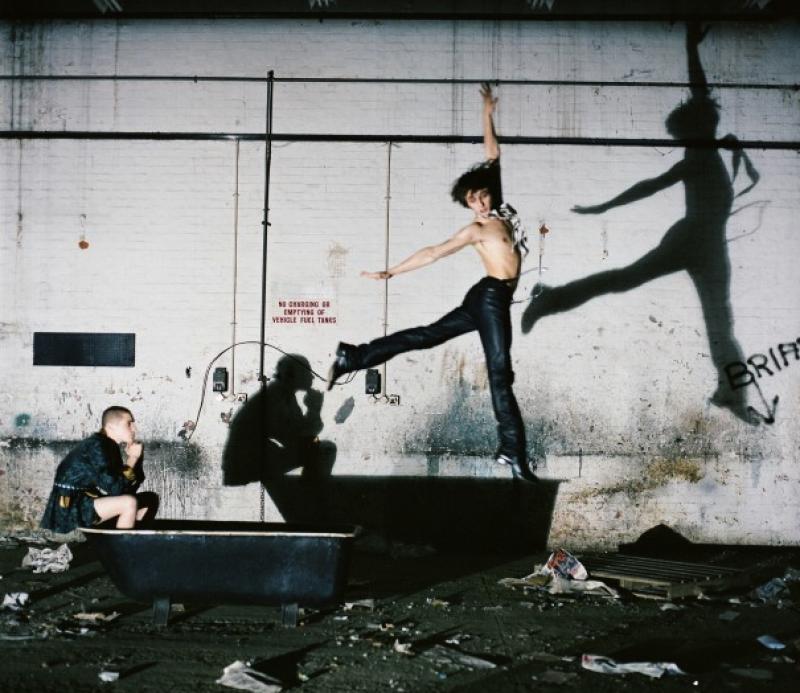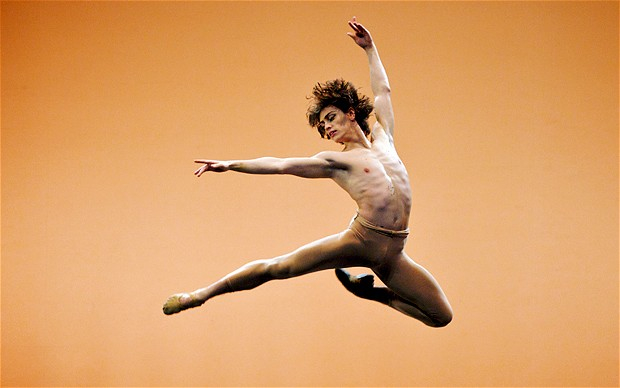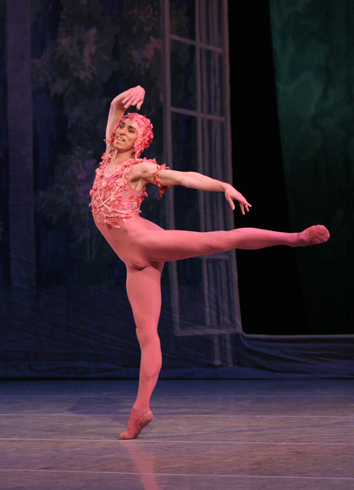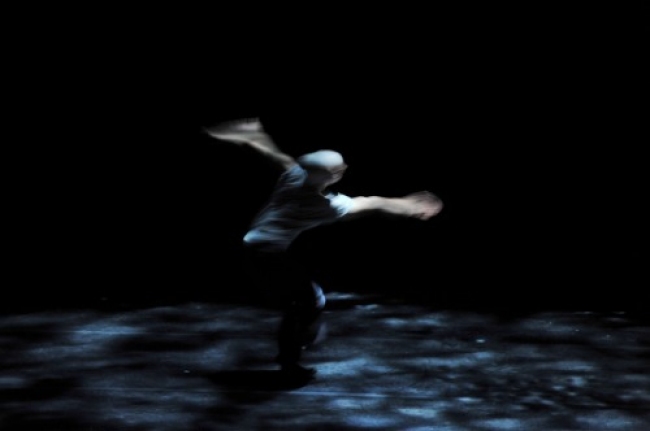Men in Motion, Sadler's Wells Theatre | reviews, news & interviews
Men in Motion, Sadler's Wells Theatre
Men in Motion, Sadler's Wells Theatre
Men in emotion a more apt title as Royal Ballet star escapee takes his first steps off the leash

Sergei Polunin’s flight this week from the Royal Ballet just as he rises to the pinnacle made last night's Sadler's Wells show a very hot ticket for those who wanted to catch his guest appearance in it. But the evening was also a proclamation that this isn’t the first time that company has mislaid one of its finer talents.
 For Men in Motion he invited Polunin to join him and five others in a male-centred programme that, in the hallowed Russian tradition, has since had changes from what’s been announced, reducing seven to five, and losing what he had wanted as a rousing male send-off, Nacho Duato's Remanso. This must have added unwanted extra tensions to a show already saddled with the apocalyptic last-minute excitement of Polunin’s leap to personal freedom (Polunin pictured by Elliott Franks).
For Men in Motion he invited Polunin to join him and five others in a male-centred programme that, in the hallowed Russian tradition, has since had changes from what’s been announced, reducing seven to five, and losing what he had wanted as a rousing male send-off, Nacho Duato's Remanso. This must have added unwanted extra tensions to a show already saddled with the apocalyptic last-minute excitement of Polunin’s leap to personal freedom (Polunin pictured by Elliott Franks).
I wonder if Putrov intended the youthful sadness that suffuses the programme. “Men in Emotion” would be a more apt title, as essentially the dance numbers are five variants on being all by yourself in the moonlight and not, to be honest, dashing about in the thrilling way that ballet chaps usually tend to do. One of the young men invoked is Nijinsky, the Ballets Russes prodigy whose emotional and mental disintegration in his mid-twenties haunts Putrov's programming.
 But the symbolism of opening with Le Spectre de la Rose, Fokine’s plangent romance where a girl dreams of her rose coming to life, strikes a false note with a performance where the dancers - one from the Mariinsky, another from English National Ballet - seem to be coming at it from different places. Spectre is almost doomed to fail because its contents are so debated, and yet it is all scent and suggestion. This ballet was where 21-year-old Nijinsky, in a rose-petalled leap, established his near-divine aura as a creature trembling with unidentified urges, neither quite animal, vegetable nor mineral. Probably the 1911 orchestra was better than last night’s scratch band, but Igor Kolb (pictured right courtesy Mariinsky Ballet, whom I’ve much admired for his danseur noble qualities in past years) was so tendrilly he was positively sweet-pea. Even the irresistible sweetness of ENB's Elena Glurdjidze in her muslin cap and ballgown couldn't override a sense that this number had been thrown together without loving care.
But the symbolism of opening with Le Spectre de la Rose, Fokine’s plangent romance where a girl dreams of her rose coming to life, strikes a false note with a performance where the dancers - one from the Mariinsky, another from English National Ballet - seem to be coming at it from different places. Spectre is almost doomed to fail because its contents are so debated, and yet it is all scent and suggestion. This ballet was where 21-year-old Nijinsky, in a rose-petalled leap, established his near-divine aura as a creature trembling with unidentified urges, neither quite animal, vegetable nor mineral. Probably the 1911 orchestra was better than last night’s scratch band, but Igor Kolb (pictured right courtesy Mariinsky Ballet, whom I’ve much admired for his danseur noble qualities in past years) was so tendrilly he was positively sweet-pea. Even the irresistible sweetness of ENB's Elena Glurdjidze in her muslin cap and ballgown couldn't override a sense that this number had been thrown together without loving care.
Then the anticipated highlights: Polunin and Putrov each did solos bare-chested. Putrov wore gold jewellery, Polunin wore tattoos. Polunin with his angry eyes and soaring leaps very nearly rescued a silly Bolshoi cameo about Narcissus (see picture above, by Elliott Franks), while Putrov over-respectfully marked out a slight Frederick Ashton gala number about sorrowing Orpheus.
In fact, in both of these Ukrainian expats the Royal Ballet lineage of male grace and seriousness is particularly marked, and both of them are, in a way, too good to bluff their way through undernourished choreography. Putrov still looks through-and-through a ballet man. Polunin's boy-with-wings physical blitheness and contrasting solemnity are qualities that only really good ballet material can help him exploit.
 So even if he was making the night's news, he wasn't the night's artistic highlight - that was Russell Maliphant’s sublime AfterLight (Part 1) , a spinning, mesmerisingly intricate solo inspired by the insanity of Nijinsky. Daniel Proietto, whose pipe-cleaner body and tracksuit is a world away from ballet, seemed to exist only in the hypnotic revolving of the half-light’s dapplings and shadows, in the threads between the notes of Satie’s 4 Gnossiennes. In the third Gnossienne he threw off his hoodie and became the spirit of a barely born lad blown like tumbleweed over the stage. Lost boys, let them not be mad, not mad, sweet heaven.
So even if he was making the night's news, he wasn't the night's artistic highlight - that was Russell Maliphant’s sublime AfterLight (Part 1) , a spinning, mesmerisingly intricate solo inspired by the insanity of Nijinsky. Daniel Proietto, whose pipe-cleaner body and tracksuit is a world away from ballet, seemed to exist only in the hypnotic revolving of the half-light’s dapplings and shadows, in the threads between the notes of Satie’s 4 Gnossiennes. In the third Gnossienne he threw off his hoodie and became the spirit of a barely born lad blown like tumbleweed over the stage. Lost boys, let them not be mad, not mad, sweet heaven.
Putrov’s first choreographic creation looks very green after it. Ithaka is a trio derivative of Glen Tetley’s superb Pierrot Lunaire, whose central character, a Pierrot learning about life from his perch on a climbing frame, was probably Putrov’s most heartfelt incarnation at Covent Garden. But his revised narrative of a youth buffeted between male and female sex urges - embodied by a hirsute Aaron Sillis and the bodacious Glurdjidze - looks naff, with Putrov as some sub-Béjart glory boy in undercooked ballet steps, in front of pastel walls and a large black window by Gary Hume. A climax (inasmuch as I could tell in this indecisive emotional arc) was indicated when the window jerked upwards suddenly about 12 inches. “It ends perhaps without an apparent resolution,” writes Putrov in the programme. Don’t all the bad ones?
In the wayward circumstances, this is a skimpy evening to look at, yet - if only the orchestra were better - it’s aurally intriguing. With the music’s journeys between the Ballets Russes boudoirs of Weber’s Invitation to the Dance and Dukas’s La Péri, the spicier splurges of Nikolai Tcherepnin’s Narcisse and the spiritual limbo of Satie’s noodlings and the Gluck Blessed Spirits, there’s an atmospheric musical odyssey there that lifts the evening clear from a vanity project. Putrov has nice musical intelligence; now he needs nice choreographic intelligence. All the worse then that the programme is so cavalier with information about the music.
Explore topics
Share this article
Add comment
The future of Arts Journalism
You can stop theartsdesk.com closing!
We urgently need financing to survive. Our fundraising drive has thus far raised £49,000 but we need to reach £100,000 or we will be forced to close. Please contribute here: https://gofund.me/c3f6033d
And if you can forward this information to anyone who might assist, we’d be grateful.

Subscribe to theartsdesk.com
Thank you for continuing to read our work on theartsdesk.com. For unlimited access to every article in its entirety, including our archive of more than 15,000 pieces, we're asking for £5 per month or £40 per year. We feel it's a very good deal, and hope you do too.
To take a subscription now simply click here.
And if you're looking for that extra gift for a friend or family member, why not treat them to a theartsdesk.com gift subscription?
more Dance
 'We are bowled over!' Thank you for your messages of love and support
Much-appreciated words of commendation from readers and the cultural community
'We are bowled over!' Thank you for your messages of love and support
Much-appreciated words of commendation from readers and the cultural community
 R:Evolution, English National Ballet, Sadler's Wells review - a vibrant survey of ballet in four acts
ENB set the bar high with this mixed bill, but they meet its challenges thrillingly
R:Evolution, English National Ballet, Sadler's Wells review - a vibrant survey of ballet in four acts
ENB set the bar high with this mixed bill, but they meet its challenges thrillingly
 Like Water for Chocolate, Royal Ballet review - splendid dancing and sets, but there's too much plot
Christopher Wheeldon's version looks great but is too muddling to connect with fully
Like Water for Chocolate, Royal Ballet review - splendid dancing and sets, but there's too much plot
Christopher Wheeldon's version looks great but is too muddling to connect with fully
 iD-Reloaded, Cirque Éloize, Marlowe Theatre, Canterbury review - attitude, energy and invention
A riotous blend of urban dance music, hip hop and contemporary circus
iD-Reloaded, Cirque Éloize, Marlowe Theatre, Canterbury review - attitude, energy and invention
A riotous blend of urban dance music, hip hop and contemporary circus
 How to be a Dancer in 72,000 Easy Lessons, Teaċ Daṁsa review - a riveting account of a life in dance
Michael Keegan-Dolan's unique hybrid of physical theatre and comic monologue
How to be a Dancer in 72,000 Easy Lessons, Teaċ Daṁsa review - a riveting account of a life in dance
Michael Keegan-Dolan's unique hybrid of physical theatre and comic monologue
 A Single Man, Linbury Theatre review - an anatomy of melancholy, with breaks in the clouds
Ed Watson and Jonathan Goddard are extraordinary in Jonathan Watkins' dance theatre adaptation of Isherwood's novel
A Single Man, Linbury Theatre review - an anatomy of melancholy, with breaks in the clouds
Ed Watson and Jonathan Goddard are extraordinary in Jonathan Watkins' dance theatre adaptation of Isherwood's novel
 Peaky Blinders: The Redemption of Thomas Shelby, Rambert, Sadler's Wells review - exciting dancing, if you can see it
Six TV series reduced to 100 minutes' dance time doesn't quite compute
Peaky Blinders: The Redemption of Thomas Shelby, Rambert, Sadler's Wells review - exciting dancing, if you can see it
Six TV series reduced to 100 minutes' dance time doesn't quite compute
 Giselle, National Ballet of Japan review - return of a classic, refreshed and impeccably danced
First visit by Miyako Yoshida's company leaves you wanting more
Giselle, National Ballet of Japan review - return of a classic, refreshed and impeccably danced
First visit by Miyako Yoshida's company leaves you wanting more
 Quadrophenia, Sadler's Wells review - missed opportunity to give new stage life to a Who classic
The brilliant cast need a tighter score and a stronger narrative
Quadrophenia, Sadler's Wells review - missed opportunity to give new stage life to a Who classic
The brilliant cast need a tighter score and a stronger narrative
 The Midnight Bell, Sadler's Wells review - a first reprise for one of Matthew Bourne's most compelling shows to date
The after-hours lives of the sad and lonely are drawn with compassion, originality and skill
The Midnight Bell, Sadler's Wells review - a first reprise for one of Matthew Bourne's most compelling shows to date
The after-hours lives of the sad and lonely are drawn with compassion, originality and skill
 Ballet to Broadway: Wheeldon Works, Royal Ballet review - the impressive range and reach of Christopher Wheeldon's craft
The title says it: as dancemaker, as creative magnet, the man clearly works his socks off
Ballet to Broadway: Wheeldon Works, Royal Ballet review - the impressive range and reach of Christopher Wheeldon's craft
The title says it: as dancemaker, as creative magnet, the man clearly works his socks off
 The Forsythe Programme, English National Ballet review - brains, beauty and bravura
Once again the veteran choreographer and maverick William Forsythe raises ENB's game
The Forsythe Programme, English National Ballet review - brains, beauty and bravura
Once again the veteran choreographer and maverick William Forsythe raises ENB's game

Comments
What a review! I was there
Dear Ismene, Could you
You're right. But there is a
You're right. But there is a hallowed Russian tradition of sudden unforeseen non-shows of billed artists - as Les Ballets Trockadero say at every performance, "Tonight there will be changes..." Nowadays last-minute visa issues are more a UK-versus-The World tradition as this has occurred all too regularly between the UK Border Agency and Russian dancers, musicians and writers in recent years, often blighting events that have been announced well in advance. Polina Semionova was prevented last summer from opening English National Ballet's Swan Lake, pianist Grigory Sokolov and film director Abbas Kiarostami now refuse to visit Britain, and so on. The tightening in visa procedures creates a huge disincentive to overseas artists. But given that many hundreds of Russian performers do safely make it over here every year, there must be ways to avoid last-minute difficulties. I am sorry for Mr Putrov, who had enough on his plate already.
Really, one of the most